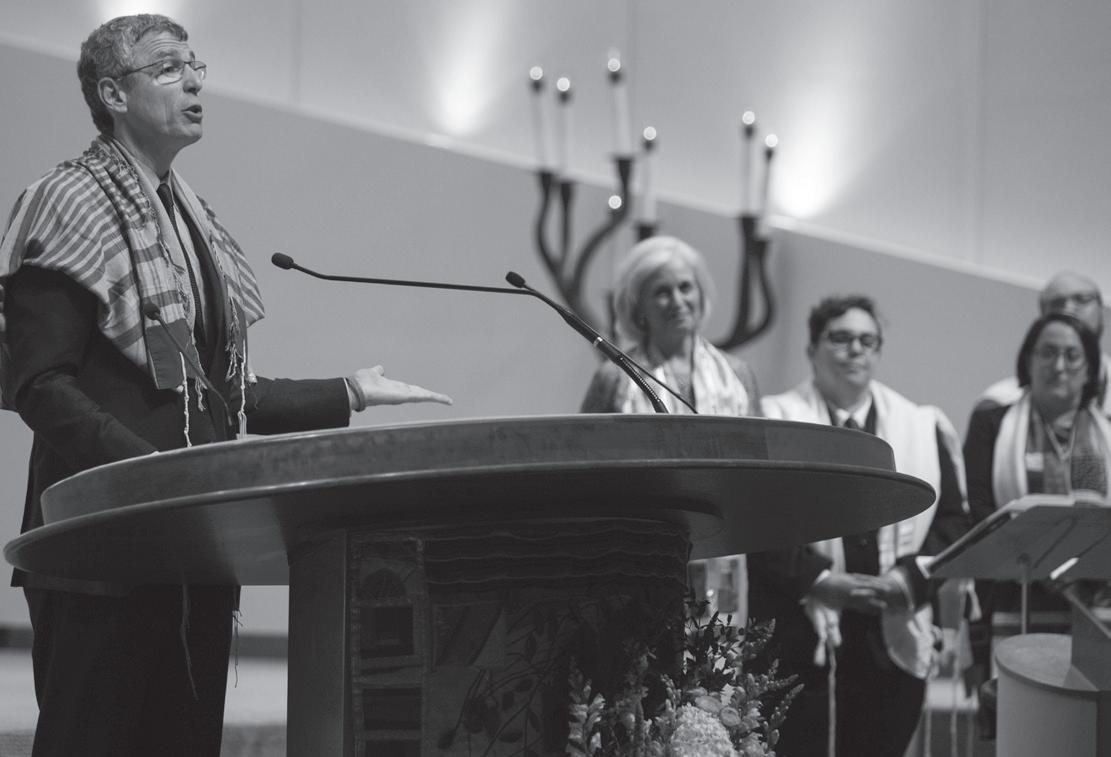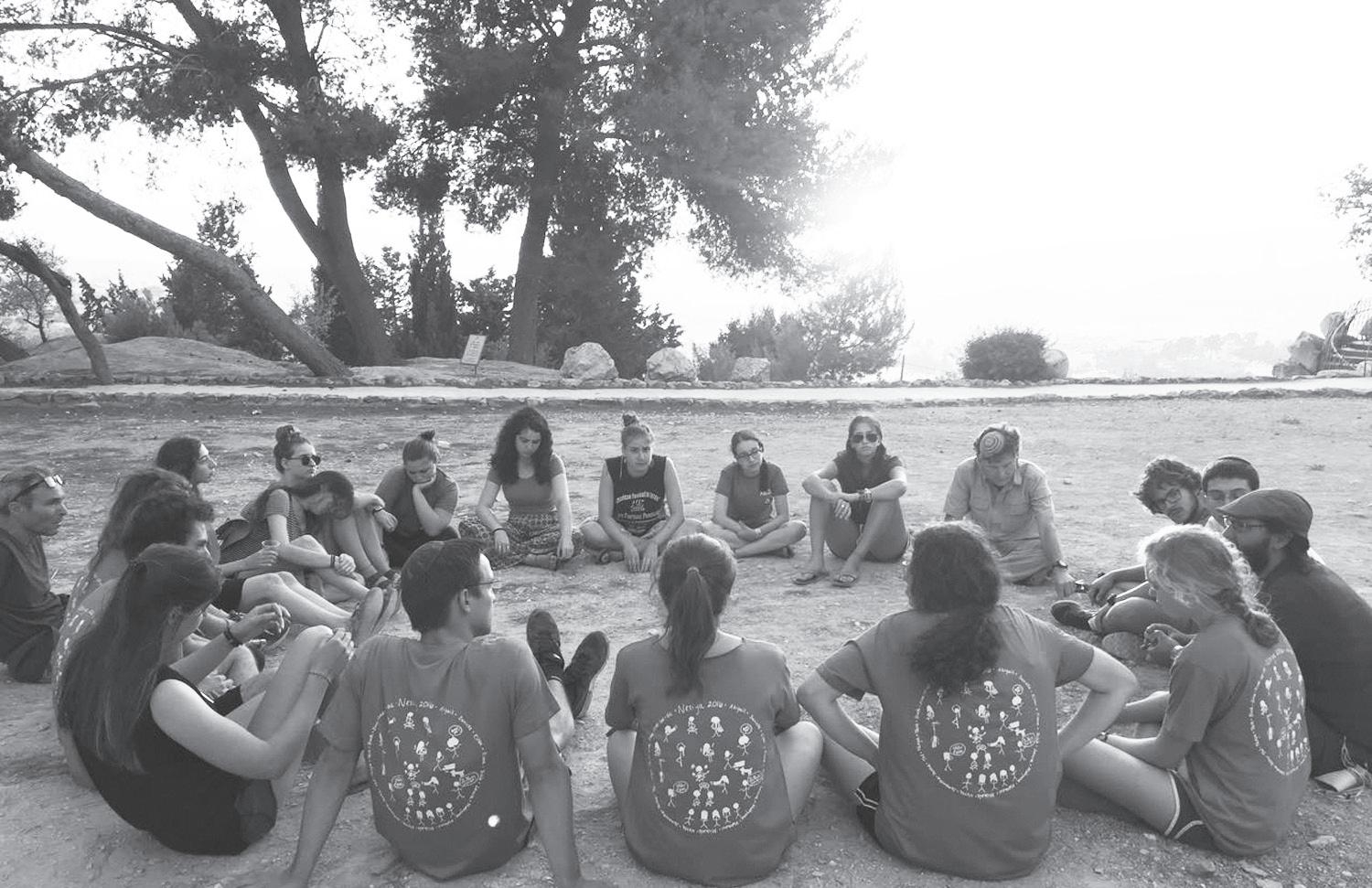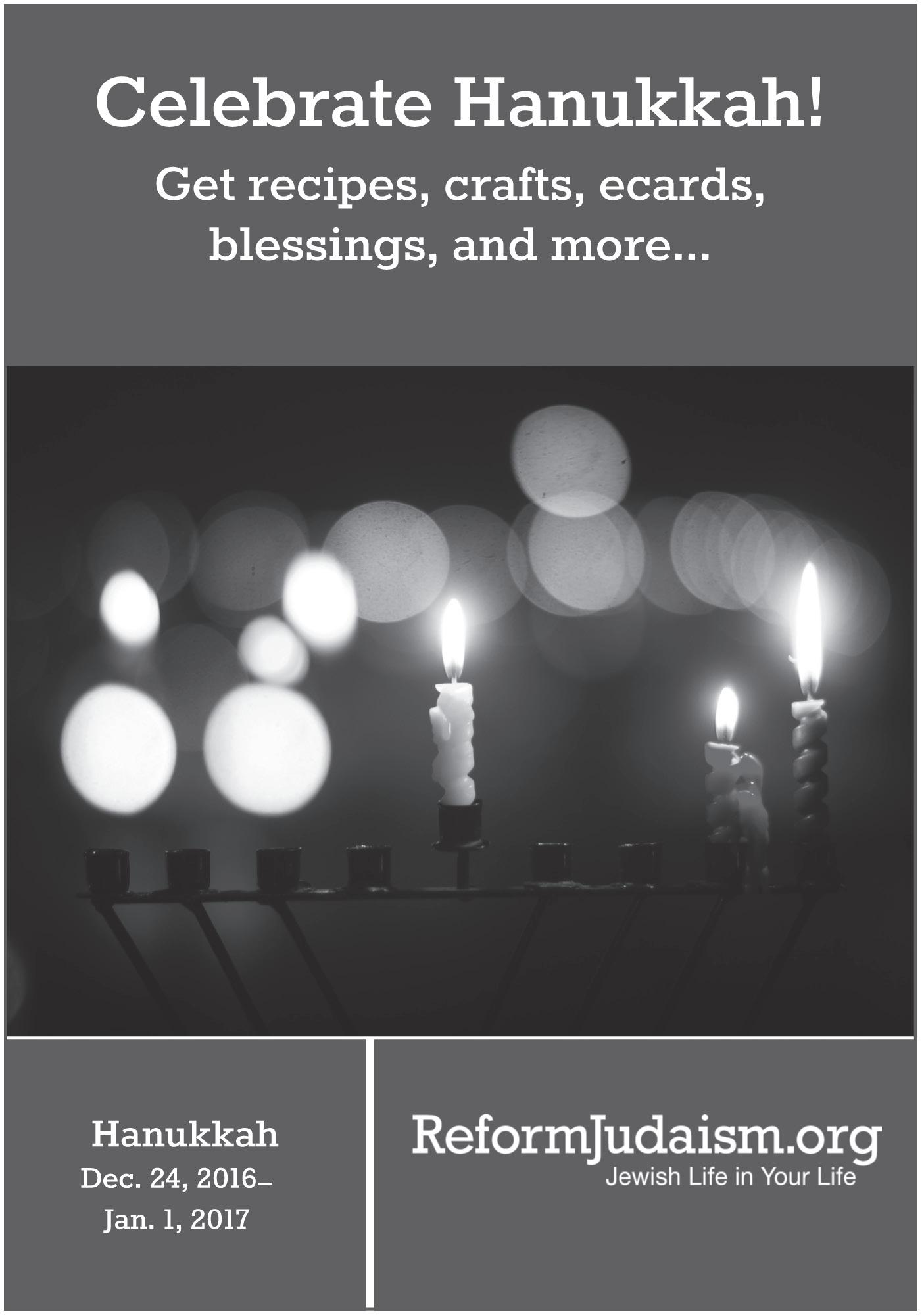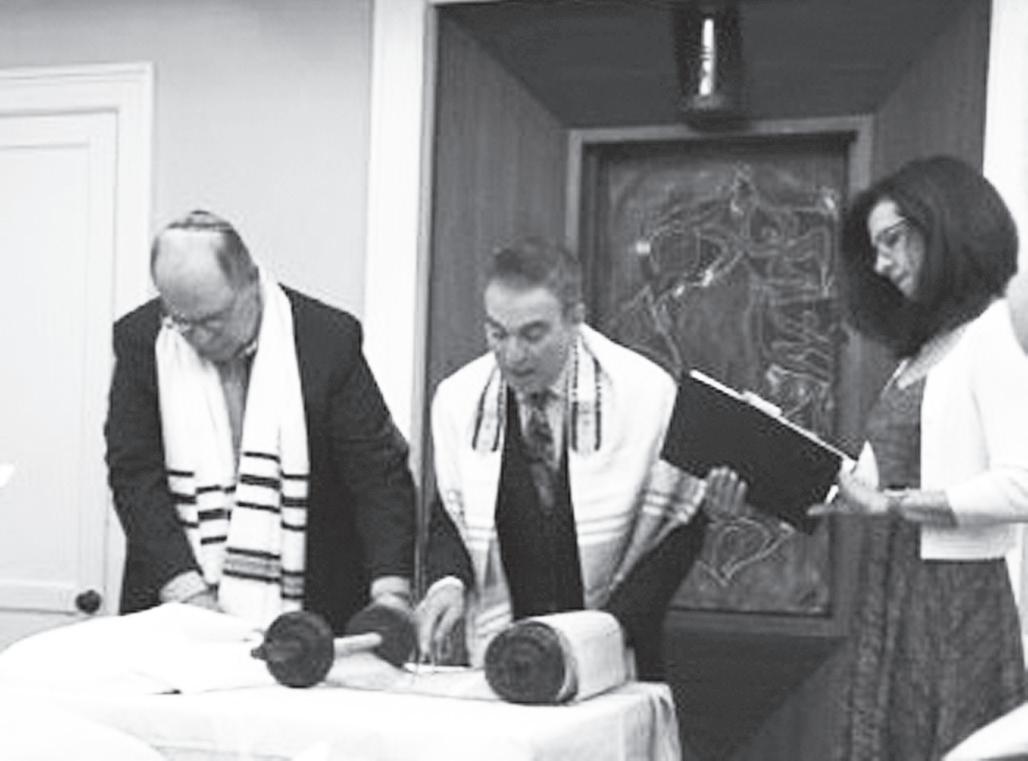
9 minute read
Reform Judaism in the 21st Century (page
PART OF SOMETHING LARGER THAN OURSELVES: REFORM JUDAISM IN THE 21ST CENTURY
By Rabbi Suzie Jacobson
Relationships
Jews join Jewish communities for different reasons. Some want a place to pray, a place to nurture their souls, and find deeper meaning. Some want a place to learn, a place to ask the hard questions, and connect with ancient history and tradition. Some want a place to go, a place where they are recognized, and a place to find connection. When we join a Jewish community we find that we are part of something larger than ourselves. The amazing blessing of Temple Israel is that being a part of this community means that we are part of something even larger than this large community—we are a part of Reform Judaism, the largest Jewish denomination in the United States. We also have many close, personal connections with leaders in the Reform movement, including Rabbi Rick Jacobs, President of the Union of Reform Judaism, and Rabbi Jonah Pesner, Director of the Religious Action Center of Reform Judaism.
Since Jews gained citizenship in the post-enlightenment world, Reform Judaism has been at the forefront of creative change. Believing deeply in the importance of personal autonomy, in every generation Reform Jews have “made the old new and the new holy,” (to paraphrase former Israeli Chief Rabbi Rav Kook). Reform Jews have an ever-present awareness of our role in the world. This necessitates the prioritization of justice work, the creation of inclusive communities and an approach to Torah study that blends the richness of modern scholarship and the passion of our modern values. Temple Israel’s justice work, innovative spirit and inclusive community do not emerge from a vacuum—we are born from the best of Reform Judaism. On December 9th and
10th, we have the honor of welcoming Rabbi Aaron D.
Panken, PH.D. as our Burstein Scholar-in-Residence. Rabbi Panken is the President of Hebrew Union College - Jewish Institute (HUC-JIR), the institution that trained most of
Rabbi Rick Jacobs, President of the URJ, speaking at the Installation of Rabbi Zecher
our clergy, and a thought leader in the Reform Movement. When Rabbi Panken joins us in December, he will engage us in several conversations on Reform Judaism’s relationship with Jewish tradition:
Qabbalat Shabbat Lecture, 6:00 p.m. Embracing, Distancing, Adapting, and Refining: Reform Judaism’s Relationship with Jewish Tradition Saturday Morning Torah Study, 9:00 - 11:00 a.m. True Lies – Truth, Gossip, and the American Jewish Way Saturday Evening Havdalah, 4:00 p.m. Illuminating Hanukkah – An Exploration of How Jewish Holidays Grow and Change
At Temple Israel we connect to a people, a tradition, a movement that is larger than ourselves. Join us on December 9th and 10th as we learn from a thought leader in Reform Judaism and imagine together the creative possibilities of our shared Jewish future.
NESIYA SUMMER PROGRAM
By Sascha Wolf-Sorokin
This past summer, I traveled through Israel for five weeks on a program called Nesiya, which brings together American and Israeli Jews from all different religious backgrounds. We explored Israel, our own connection to Judaism, and fortified a unique community. I learned about myself in ways that I previously would never have thought were possible. On Nesiya, we kept Shabbat. I had never done this before, and was a little skeptical of how connected I could feel. I fell in love with Shabbat and found it incredible how life pauses and the community or city is just present and enjoying the moment. Keeping Shabbat in a city where not a single car drives and the entire city is keeping it with you was a very different experience than it would be to keep it at home. For me what was so powerful is that everyone, both those whom you know and strangers, take a break to be present and to enjoy Shabbat. Every activity we did caused you to not only question your own opinions and beliefs about the topic, but they demanded that you put your entire life out on the line for everyone to know. Because of this intensity, it created a new type of friendships. I found myself having very deep conversations with people before I even knew basic details about their life. I never thought I would have found a community in such a short amount of time, but the program that Nesiya facilitates ensures that this happens. I had heard from people how much I would love Israel, but I did not think it was possible to feel such a strong connection to a country so quickly. Despite this being my first time in Israel I felt at home, and I felt as though I belonged. To consistently be surrounded by so much history from your people, everywhere you go, and to know that you will not be the last of your people at the given was an incredible feeling. Now, I find myself yearning to be back in Israel. I couldn’t understand it before and I do not quite know how to explain it, but there is something about being in Israel that really makes you feel alive and part of something bigger than yourself. Nesiya was not just a typical tourist trip through Israel, and having Israelis as participants not only gave a different perspective to the trip, but also helped me to see Israel through the eyes of Israelis. I 100% recommend Nesiya as an incredible program for anyone considering going to Israel, and I would be more than happy to speak in more detail.


TORAH STUDY
AT TEMPLE ISRAEL
By Andrew D. Sherman
But the Study of Torah encompasses them all.1
This is the conclusion of a one of the introductory prayers of our Shabbat morning service. Honoring parents, engaging in deeds of compassion, visiting, making peace among people, arriving early for study and being devoted in prayer are all included. And it’s also a very accurate description of Shabbat morning at Temple Israel. I am one of a large number of ‘regulars’ at our Saturday morning Torah Study. I’ve also been given the honor of leading prayers, chanting Torah and guiding the study sessions. You can get it all in one morning: worship, Torah reading, learning, and socializing. There are always familiar faces to see and new people to meet. There are rhythms to reading Torah. The cycle of weekly portions, the structure of the books, chapters and verses; the familiar and the not as familiar; the comfortable and the challenging sections are all there. At Torah Study, often our clergy read from the Torah. But congregants, like me, also get opportunities. Some chant their Bar/Bat Mitzvah portion a year or years later. Connecting to our ancient rituals and setting the stage for a current discussion through the actual reading of Torah, is quite remarkable. And the opportunities for study are truly boundless. We can look at the text itself – there are meanings at the surface and understandings at other levels. And we can turn the text over and back. Discussion can go in one direction and then another and back again. Midrash,
history, Talmud, commentaries – old and new – are often introduced. And at times, we study something completely different. Applying the text and learnings to our modern world, our country, Israel, our community, and ourselves often happens. Seeing ourselves as part of “There are rhythms to reading Torah. The cycle something greater is my favorite part. Knowing that others are reading, hearing, and studying the of weekly portions, the same texts on the same Shabbat is structure of the books, powerful. Realizing that we are part chapters and verses; the of a tradition of our people stretching back thousands of years is somewhat familiar and the not as daunting. And for me personally familiar; the comfortable looking forward to discussing the and the challenging portion with my mother who is often sections are all there.” attending Torah Study at Washington Hebrew Congregation – at the same time as we are studying at Temple Israel – is really special and something I cherish. And prayer that ends with, “...but the Study of Torah encompasses them all,” begins with, “These are things that are limitless.” There is not a better description!

1 Mishkan T’Filah, page 88 [206]
PRAYER AT TEMPLE ISRAEL: THE TEFILLAH GROUP
By Em Mueller
Diversity
Early last spring I had a “get-to-know-you” cup of coffee with Carol Targum. During the course of our conversation we discovered we were both interested in prayer: What is it? How do you pray? Where and when? And what’s the point of prayer? We had enough questions that we thought we’d go to a pro. We talked with Rabbi Zecher, who told us to talk with Rabbi Jacobson, who was also interested in exploring prayer. At our meeting with her, we discovered she’d been exploring prayer…forever! Most recently, while a student at Hebrew College, she was part of a group who met in a staircase! Which right now, writing this at 3:00 a.m., brings up the image of Jacob’s ladder, planted on earth, reaching to heaven, with angels going up and down. We decided to gather some like-minded people to begin an exploration of prayer, and so the Tefillah Group was born. We met six times. Each session was led by two people, in the chevrutah style of study. The leaders met a time or two or three before their session in order to explore together their own ideas of prayers. The results were amazingly varied! One session focused on an intellectual approach to prayer; another explored chanting; another looked at one prayer then gave us the opportunity to interpret the prayer through art, creating our own midrash!
Being good Jews, we learned we needed more study of the traditions of prayer and ways other people are exploring this, which has led to an exciting series of guest speakers who will offer their own explorations and understandings this fall. Sundays will offer the Spiritual Practice Lab, trying prayer through yoga, meditation, singing, and other paths. The Tefillah Group opens its doors to the entire TI community. If you’d like to join us in exploring prayer — where, when, how to, and especially why — join us in our search. You will have space for your own ideas, and a community similarly engaged, eager to share ideas, support, and exploration. If you’d like to talk about the group or prayer, please contact me via email (em.mueller@outlook.com) or phone (617-969-2354).
All of these injunctions come from the Torah and they are being enacted and embodied by the Temple Israel community. Over the summer and through this fall, Temple Israel members have stepped forward and stepped up to ensure that we, as a congregational community, can have an active role in settling two Syrian refugee families. We have six busy teams: Fundraising, Housing, Household Setup, Understand Assisting Services, Employment, and Welcome/Integration. Our gratitude knows no bounds for the effort of so many of our Temple Israel family. If you are interested in getting involved, contact Tali Puterman, Social Justice Organizer at tputerman@tisrael.org.



